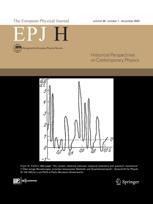Tracing the history of perturbative expansion in quantum field theory
Contrary to long-standing assumptions, simplified descriptions of quantum systems have played a central role in shaping the foundations of quantum field theory.
New York | Heidelberg, 17 May 2024
 Perturbative expansion is a valuable mathematical technique which is widely used to break down descriptions of complex quantum systems into simpler, more manageable parts. Perhaps most importantly, it has enabled the development of quantum field theory (QFT): a theoretical framework which combines principles from classical, quantum, and relativistic physics, and serves as the foundation of the Standard Model of particle physics.
Perturbative expansion is a valuable mathematical technique which is widely used to break down descriptions of complex quantum systems into simpler, more manageable parts. Perhaps most importantly, it has enabled the development of quantum field theory (QFT): a theoretical framework which combines principles from classical, quantum, and relativistic physics, and serves as the foundation of the Standard Model of particle physics.
Yet despite its importance in shaping our understanding of the universe, the role of perturbative expansion has often been understated when discussing the mathematical and philosophical foundations of QFT. Through new analysis published in EPJ H: Historical Perspectives on Contemporary Physics, James Fraser at the University of Wuppertal, together with Kasia Rejzner at the University of York, bring the special status of perturbative expansions into sharper focus, by highlighting their deep-rooted relationship with the foundations of QFT.
In fundamental physics, perturbative expansion is used extensively to extract accurate experimental predictions from QFT, which have gone on to shape the theory to its current form. All the same, the simplified descriptions offered by the technique have widely been viewed as irrelevant when discussing the mathematical and philosophical framework of the theory.
In contrast, Fraser and Rejzner argue that the mathematics of perturbative expansion has played a central role in the development QFT: often engaging directly with its foundational mathematical structure. Because of this, its importance cannot be understated when discussing the fundamental nature of the universe through QFT.
Through their paper, the duo bring the history of this relationship into sharper focus; tracing the history of the use of perturbative expansion in foundational developments in QFT. Their work could ultimately help physicists to gain a deeper understanding of the implications of theories they have developed using perturbative expansion.
Reference: Fraser, J.D., Rejzner, K. Perturbative expansions and the foundations of quantum field theory. EPJ H 49, 10 (2024). https://doi.org/10.1140/epjh/s13129-024-00075-6
Further Information
For more information visit: www.epj.org
Services for Journalists
The full-text article is available here.
Contact
Sabine Lehr | Springer | Physics Editorial Department
tel +49-6221-487-8336 | sabine.lehr@springer.com